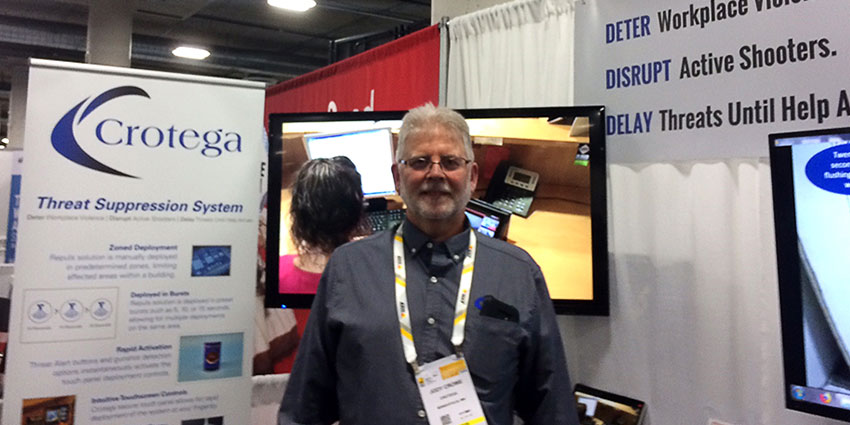After the 2012 Sandy Hook school shooting, Jody Allen Crowe set out to develop a threat suppression tool to address school violence. Five years later, the result of that effort is the Crotega Threat Suppression System, displayed this year at ISC West.
The remotely-deployed threat suppression system drenches a perpetrator with a repulsive water-based solution, thus impairing their ability to enact violence. The solution irritates eyes, throat, lungs and skin, but does not cause permanent injury. Cleanup is easy using water and detergent. The solution is manually deployed in predetermined zones, which limits the affected areas in a building. Touch-screen control enables rapid deployment, which can also be integrated with Threat Alert buttons and/or gunshot detection.
Benefits of suppression systems
The Crotega Threat Suppression System is designed to deter workplace violence, disrupt active shooters, and delay threats until help can arrive. Introduction of the system is timely given the unrelenting sequence of school shootings and workplace violence that dominate the news. The system uses a “Repuls” solution sprayed from the ceiling in 5-, 10- or 15-second bursts.We did the industry standard testing to make sure we had a product that wouldn’t harm anybody”
Crowe started the company in 2013 after Sandy Hook, doing research in his garage for the first couple of years. Investors joined and, in 2014, the long journey began to bring the system to market. The process involved obtaining multiple patents, testing the product, and addressing any fire code or other regulatory issues surrounding its use.
Crotega has been working with fire marshals in their home state of Minnesota for three years to address fire code issues and has determined that there are no concerns. There are only 30 seconds of spray in the tank, so it does not delay building egress and doesn’t conceal or shroud an egress.
“We did the industry standard testing to make sure we had a product that wouldn’t harm anybody,” says Crowe, Crotega Founder and President. “It’s intensely irritating, but it doesn’t do any irreparable harm to anybody.”
Since last August, the company has moved from product development into full-scale marketing. An in-house sales team locates end user customers, and then puts them in touch with a local integrator in the area.
 |
| Crowe started the company in 2013 after Sandy Hook, doing research in his garage for the first couple of years |
Exhibiting to integrators
“We’re pulling the sales through integrators to train them to become a self-sustaining integrator for us,” says Crowe. “There are a couple of integrators we are training, and then we are finding other integrators that are meeting our requirements.
“They can’t just do surveillance because there is a mechanical install involved, too. They have to be able to handle the mechanical install and then link it to surveillance.” As an exhibitor in the Emerging Technology Zone at ISC West, Crotega showed the product off to integrators and consultants.
“This year our ISC West schedule filled up,” says Crowe. “We are lining up consultants to work with us, and we had some people bringing customers to see us at ISC.”Violence, especially in the back-of-the-house in Indian casinos, is a big issue. And that has energised that vertical for us"
Current events tend to keep active shooter incidents and workplace violence top-of-mind. For example, the Las Vegas shooting in October energised awareness about the possibility of casino violence throughout the gaming industry, Crowe says.
“It got people thinking,” he comments. “We don’t hear much about violence in casinos – especially Indian casinos, which are very quiet about what happens there. But violence, especially in the back-of-the-house in Indian casinos, is a big issue. And that has energised that vertical for us.” Other vertical markets include government buildings, military buildings, commercial buildings and religious buildings.
Before founding Crotega, Jody Allen Crowe spent 18 years on Native American reservations as a teacher, principal and superintendent, where he observed the effects of prenatal exposure to alcohol. He developed school programs designed around the research of brain damage from Fetal Alcohol Syndrome.
Crowe is also the founder of Healthy Brains for Children, a non-profit organisation focused on lowering the incidence of prenatal exposure to alcohol. Crowe has written a book, “The Fatal Link,” that posits a connection between perpetrators of school violence and pre-natal exposure to alcohol.

